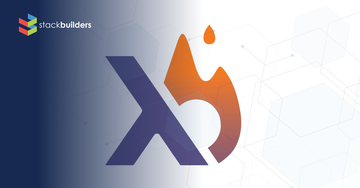Introduction
Hiring developers is never just about filling a seat; it's about bringing in the right expertise to build reliable, maintainable, and scalable software. If you're considering Haskell for your next project, or already use it in production, you’re likely aware of its reputation for delivering precision and performance through functional programming.
But finding the right Haskell talent can be a challenge.
Whether you're scaling a fintech backend, building high-assurance systems, or exploring functional programming for the first time, knowing how to hire Haskell developers is critical. Unlike more mainstream languages, Haskell requires a different mindset, and the community, while incredibly talented, is smaller and more specialized in its focus.
At Stack Builders, we’ve helped companies around the world build successful products with Haskell. In this post, we’ll walk you through what makes Haskell unique from a hiring perspective, how to evaluate developers effectively, and when it might make sense to turn to Haskell consulting firms like ours.
Not Familiar With Haskell? Why do Companies Choose It?

Image Source: The Knowledge Academy
Haskell is a deliberate choice for organizations that value correctness, maintainability, and long-term scalability.
At its core, Haskell is a purely functional language with a powerful type system that helps developers catch errors at compile time rather than in production. Features like immutability by default, referential transparency, and strong static typing reduce bugs and simplify reasoning about code. These qualities make Haskell a top choice for teams that can’t afford to compromise on software quality.
Companies in highly regulated or high-complexity industries, such as fintech, cybersecurity, healthcare, and infrastructure, often turn to Haskell development when other languages start to show their limits.
But the benefits aren’t just theoretical. Teams that adopt Haskell report better developer satisfaction, fewer regressions, and codebases that are easier to refactor and evolve over time. These advantages compound as your software and your team grow.
If your goal is to build resilient systems with fewer surprises, investing in Haskell (and in hiring the right Haskell developers) can be a strategic decision that pays off for years to come.
The Challenge of Hiring Haskell Developers
While Haskell offers significant advantages in building robust and maintainable software, sourcing qualified Haskell developers presents unique challenges.
A Specialized Talent Pool
Haskell's emphasis on pure functional programming and advanced type systems requires developers with a strong foundation in computer science and mathematics. This specialization results in a smaller talent pool compared to more mainstream languages like JavaScript or Python. Consequently, companies often find it challenging to locate developers who not only understand Haskell's paradigms but can also apply them effectively in real-world scenarios.
Growing Demand Amidst Limited Supply
Despite its niche status, the demand for Haskell developers is on the rise. Industries such as finance, blockchain, and cybersecurity are increasingly adopting Haskell for its reliability and performance benefits.
This surge in demand, coupled with a limited supply of experienced Haskell developers, has led to competitive compensation packages.
Evaluating Haskell Expertise
Assessing a candidate's proficiency in Haskell goes beyond traditional coding tests. Effective evaluation often involves reviewing contributions to open-source Haskell projects, understanding functional programming concepts, and the ability to write clean, type-safe code. Employers may need to adapt their hiring processes to accurately gauge these specialized skills.
What to Look for in a Haskell Developer
Hiring a Haskell developer involves identifying a blend of specialized technical skills, problem-solving abilities, and a mindset aligned with functional programming principles. Here's what to consider:
Core Technical Competencies
- Functional Programming Expertise
Haskell is a purely functional language, so developers should be comfortable working with concepts like immutability, higher-order functions, and pure functions. These paradigms are critical to building clean, testable code. - Advanced Type System Knowledge
Haskell’s powerful type system is a core part of what makes it robust and reliable. Familiarity with type inference, algebraic data types, and type classes allows developers to prevent whole classes of bugs at compile time. - Concurrency and Parallelism
Haskell offers advanced concurrency models, such as Software Transactional Memory (STM), which simplify thread-safe programming. A strong candidate should understand these tools and when to apply them.
Problem-Solving Abilities
Haskell encourages abstraction and composability, meaning a developer must be able to reason about systems and data transformations at a high level. Strong problem-solving skills are essential.
Attention to Detail
Because of its precision and strictness, Haskell doesn’t tolerate shortcuts. Even small mistakes in logic or type declarations can result in compiler errors. Developers who thrive in Haskell tend to have a meticulous mindset.
Continuous Learning and Adaptability
The Haskell ecosystem is evolving, with new libraries, frameworks, and tooling emerging regularly. Developers who keep up with these changes stay more effective and write more idiomatic, maintainable code.
Collaborative Mindset
Though Haskell can sometimes be perceived as academic or isolated, real-world development happens in teams. A successful Haskell developer should also be a good communicator and collaborator. Soft skills like communication and adaptability are crucial for maintaining productivity and alignment across teams.
How to Evaluate Haskell Talent Effectively
When you're looking to hire Haskell developers, the traditional technical interview won't cut it. Haskell's unique features require an equally unique hiring approach. Whether you're building a full-time team or exploring Haskell consulting, here’s how to identify top-tier talent.
1. Go Beyond Standard Coding Tests
Generic algorithm challenges aren’t ideal for assessing Haskell expertise. Instead, use functional programming challenges that test real-world problem-solving, recursion, and familiarity with monads or type classes. Platforms like CodeInterview.io are excellent for running collaborative live coding sessions tailored to Haskell development environments.
2. Prioritize Real-World, Functional Scenarios
If you're offering Haskell programming jobs, evaluate candidates using scenarios they’re likely to encounter on the job. This helps you uncover whether candidates think in terms of pure functions, composability, and correctness, all central to professional Haskell development.
3. Review GitHub Contributions
One of the best ways to assess a candidate’s skill level is through their contributions to open-source projects. Browsing relevant GitHub repositories can reveal:
- Idiomatic Haskell usage
- Comprehension of advanced features like lenses or GADTs
- Quality of testing and documentation practices
- Ability to work within collaborative development flows
This is especially helpful if you're trying to hire remotely or from a global pool of applicants.
Bonus: Check out the Stack Builders open-source projects to see how our team works!

4. Probe for Conceptual Fluency
Whether you're recruiting internally or via consulting firms, the right candidate should be able to explain and apply key Haskell concepts:
- Monads, Functors, and Applicatives
- Type classes and polymorphism
- Software Transactional Memory (STM) and concurrency primitives
- Lazy vs. strict evaluation strategies
Referencing documentation from Haskell.org or the Haskell Wiki on Monads can help ensure your evaluation process stays grounded in best practices.
5. Evaluate Communication and Collaborative Skills
In Haskell programming jobs, especially those that require team interaction or mentorship, communication is critical. Include a short pair programming task or request a code walkthrough during the interview. This will help you understand:
- How well the candidate articulates their logic
- Their ability to teach or guide others
- Whether they can explain advanced concepts clearly to cross-functional teams
A thoughtful, Haskell-specific hiring process can dramatically improve your ability to attract and identify the right talent. Whether you're building a full internal team or exploring outsourcing partnerships, clear evaluation standards will ensure you're choosing developers who align with your long-term engineering goals.
Alternatives to In-House Hiring: Haskell Consulting
If you’ve tried to hire Haskell developers and found the process slower or more complex than expected, you’re not alone. Many companies struggle to scale Haskell teams quickly due to the specialized skill set, limited talent pool, and competitive market. That’s where Haskell consulting firms become a valuable alternative.
When Does Haskell Consulting Make Sense?
- You need senior Haskell developers quickly.
Rather than spending months on recruiting, you can onboard experienced engineers from a consulting firm who already excel at production-grade Haskell development. - You’re launching a greenfield project with high correctness requirements.
Haskell consultants bring domain-specific experience, whether you’re building financial applications, blockchain platforms, or distributed systems, which helps avoid early design mistakes. - You want to train your internal team.
Leading Haskell consultancies work alongside your developers to raise the functional programming baseline through mentorship and code reviews. - You’re unsure whether to scale a full-time team.
Starting with consultants allows you to deliver value while keeping long-term commitments flexible. This is different from a “dev-shop” model or recruiting agency. Instead, these developers embed in your team.
Benefits of Working with Haskell Consulting Firms
- Accelerated onboarding: Skip the learning curve with engineers who already “speak” Haskell fluently and follow best practices.
- Battle-tested processes: Consultants bring tooling, patterns, and architectural insight from prior projects, so you don’t reinvent the wheel.
- Focus on outcomes: You can scope short- or long-term engagements based on milestones and deliverables, giving you control over budget and priorities.
At Stack Builders, for example, we’ve helped clients integrate Haskell successfully, whether through complete project delivery or as an extension of their engineering teams.
A Strategic Choice
Choosing a consulting model isn’t just about filling a gap; it’s about moving faster with less risk. By exploring these options, you gain the flexibility to move forward confidently, even in a talent-constrained market.
You might be wondering: where do I find the best Haskell talent? How do I investigate for hiring full-time roles or consulting support?
Where to Find Haskell Developers
Whether you’re looking to hire full-time or augment your team through a firm, knowing where to find qualified candidates is half the battle. Given the language’s niche but growing ecosystem, traditional recruiting channels may not be enough. Here's where to look.
1. Specialized Job Boards and Communities
General-purpose job sites can be hit-or-miss for Haskell roles. Instead, try platforms tailored to functional programming or remote tech talent:
- Functional Jobs – A go-to board for roles in Haskell development and more.
- Haskell.org Jobs Page – Hosted by the official Haskell community and often frequented by experienced developers.
- Stack Overflow Jobs (archived listings) – While the platform has retired its jobs section, many hiring managers still discover talent through user profiles and Haskell-related questions.
- Remote OK – Includes Haskell programming jobs with flexible location requirements.
2. Open Source Communities and GitHub
Many top Haskell developers are active in the open-source space. Searching GitHub for contributors to popular Haskell libraries is a smart way to find talent. Engaging with developers via issues or contribution reviews gives insight into both their skills and collaboration style.
- Tip: Search GitHub with keywords like “language:Haskell stars:>100” to find high-quality repos and their contributors.
3. Online Communities and Forums
Haskell has a passionate and tight-knit community. Participating in these spaces can help you spot potential candidates early, especially those looking for Haskell programming jobs or consulting work.
- r/haskell on Reddit – Great for job postings, AMAs, and community engagement.
- Haskell Discourse – Used by both beginners and seasoned professionals to discuss best practices, opportunities, and ecosystem developments.
- Haskell-Cafe Mailing List – Longstanding hub for community Q&A and job leads.
4. Conferences and Meetups
Attending or sponsoring Haskell-related events is a powerful way to connect with experienced developers. This might include:
- Haskell eXchange – Focused on practical, real-world Haskell development case studies and thought leadership.
Even if you’re not attending in person, many of these events maintain public Slack or Discord channels where job postings and consulting inquiries are welcome.
5. Partner with a Haskell Consulting Firm
When in-house hiring timelines are tight, partnering with a firm like Stack Builders can help you bypass sourcing altogether. Consulting firms already employ vetted, senior developers who can integrate with your team quickly and help deliver production-quality code from day one.
No matter which route you take, job boards, GitHub, communities, or consulting, the key to finding great Haskell talent is meeting them where they already are: deeply engaged with the language and passionate about quality software.
How Stack Builders Can Help
At Stack Builders, we’ve spent over a decade helping companies solve complex engineering problems with elegant, maintainable solutions, and Haskell is one of our core specialties.
Whether you’re struggling to hire Haskell developers in-house or need to scale a team fast for an upcoming release, our consultants bring the expertise, reliability, and flexibility to meet your needs.
Why Clients Choose Us for Haskell Consulting
- Deep Haskell Expertise
We don’t just use Haskell, we help shape its ecosystem. Our engineers contribute to open-source libraries, speak at major functional programming conferences, and write blog posts that advance the craft. - Battle-Tested Delivery Process
Our approach emphasizes correctness, maintainability, and communication. We follow industry best practices, like strong typing, property-based testing, and clean architecture, to deliver code that scales. Our engineers undergo a rigorous Haskell Training Course to help serve you best. - Flexible Engagement Models
From short-term audits to long-term team augmentation, we offer multiple ways to collaborate. Whether you need one senior engineer or a fully integrated delivery team, our services adapt to your pace and goals. - Global Reach, Local Insight
We work across time zones, and our developers integrate seamlessly with your team, remote or on-site, while maintaining clear communication and fast feedback loops.

Real Results from Real Clients
Our clients stay with us for years because we prioritize quality and partnership. We’ve helped teams:
- Refactor monolithic systems into maintainable Haskell services
- Migrate legacy code to modern, type-safe platforms
- Build performant APIs and data pipelines from the ground up
If you're evaluating options to hire internally or exploring how an external firm can support your roadmap, Stack Builders is here to help.
Hire Haskell Developers with Confidence
From the challenges of sourcing talent to evaluating skills and navigating the hiring process, bringing Haskell developers onto your team requires a thoughtful approach. Whether you're building an in-house team or considering a partnership, knowing what to look for and where to look can save you time, budget, and future technical debt.
At Stack Builders, we make that process easier.
We help companies like yours launch, scale, and modernize software projects through high-quality Haskell development, deep technical expertise, and a collaborative consulting model that’s tailored to your goals. Whether you’re ready to build now or still weighing your options, we’re here to guide you.
Want to get started? Schedule a 15-30 minute consultation call so that we can assess your needs.






